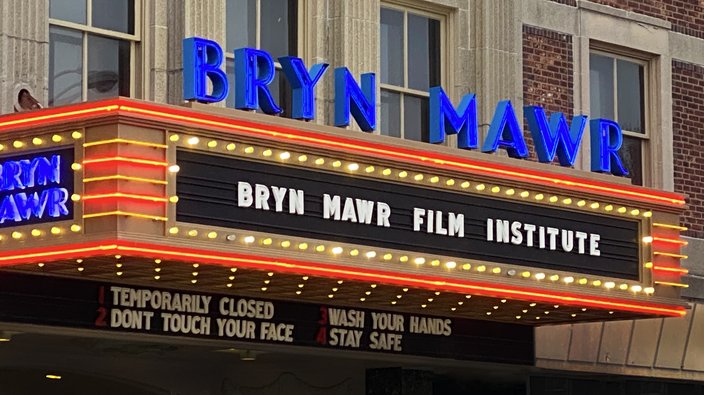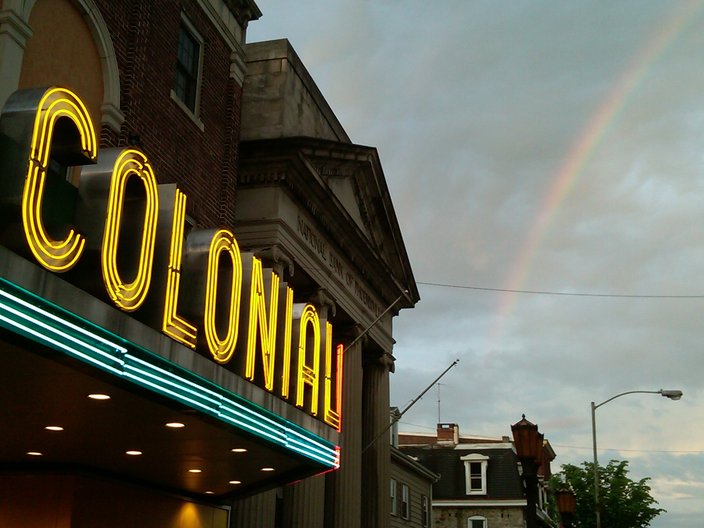The Bryn Mawr Film Institute was ready to party when its doors opened five years ago from today. It was the Main Line nonprofit's 15th birthday, and it had ordered hundreds of cupcakes for the occasion.
But in a cruel twist, this would be a memorable birthday for all the wrong reasons. March 12, 2020, was the last day the theater welcomed customers through its doors for the rest of the year. Later that afternoon, Gov. Tom Wolf issued an advisory discouraging people from visiting movie theaters to stop the spread of COVID-19. BMFI, the Philadelphia Film Society, Landmark Theatres, Regal, AMC and the Colonial Theatre in Phoenixville all shuttered in a matter of days and wouldn't fully return to normal operations until 2021, when vaccines against the coronavirus rolled out to the masses.
Industry experts and casual movie fans have been speculating about the future of movie theaters ever since. Domestic box office plunged from $11.4 billion in 2019 to about $2.2 billion in 2020, and while exhibitors have clawed back a significant chunk of change, they still haven't returned to that pre-pandemic haul. The 2024 total was $8.7 billion, a slight dip from the $9.03 billion generated in 2023. Experts attribute this decline to the back-to-back Writers Guild of America and Screen Actors Guild strikes, which stalled the production and release of numerous films.
The Philly region's independent movie theaters admit that new release revenue isn't what it used to be, but they're seeing unprecedented growth in other areas. At BMFI, attendance of repertory screenings is 10% higher than it was 2019, and enrollment in their education program is up 30%. The Colonial Theatre has likewise seen a bigger appetite for older, classic movies and responded with regular series like Art House Cinema Sundays. The Philadelphia Film Society, which has drastically expanded its second-run programming since the onset of COVID-19, said its membership has reached an all-time high of nearly 3,600 people, a milestone they hadn't hit before the pandemic.
The people who run these companies are enthusiastic and optimistic about their future, but it took five years to get there.
How movie theaters survived 2020
When film programmers cast their minds back to March 2020, they tend to tell the same story: We all thought we'd be gone for a few weeks. It turned out to be much longer.
As COVID rates climbed through the Philadelphia region, independent movie theaters had to start thinking of long-term solutions. Without a physical space to screen films, most turned to virtual platforms. Moviegoers would pay a fee to screen movies, mostly from smaller distributors, through a theater's on-demand portal. Staff would set their theaters apart with bonus features like communal viewing options or recorded introductions. The Colonial Theatre let people run wild with the latter assignment.
"At one point we had a volunteer who did a floating head," said Bob Trate, director of programming for the Colonial Theatre. "We had a sci-fi movie and he was floating and talking, just his head inside a TV box. I went to a graveyard myself and shot an opening for 'Night of the Living Dead.' It was something to keep us entertained and give us this little extra thing to do."
PFS capitalized on the late-summer weather by opening a drive-in theater at the Navy Yard in August. The pop-up remained open through Jan. 3, 2021, and returned after a brief pause during the coldest winter months. The setup allowed the group to host its annual film festival safely in the fall of 2020. PFS planned another outdoor event at Cira Green to accommodate its Oscar party.
"The two cool things are that even in the pandemic, we didn't skip an annual event," said Andrew Greenblatt, CEO and executive director of PFS. "Both of them continued and have not had a break in their runs, which is really exciting."
These remote and outdoor viewing options only stretched so far. PFS, BMFI and the Colonial Theatre all received various government assistance to sustain themselves through the initial wave of COVID-19. All three obtained funds from the Shuttered Venue Operators Grant program, which provided up to $10 million to closed businesses. PFS and the Colonial Theatre also took out Paycheck Protection Program loans.
While these infusions carried theaters into 2021, there were losses along the way. Some staff were temporarily furloughed, others never returned. The landlord of PFS Roxy took the property back, shuttering the theater in the process. But better days were on the horizon, thanks, in part, to Barbenheimer.
 Provided image/Bryn Mawr Film Institute
Provided image/Bryn Mawr Film Institute
The Bryn Mawr Film Institute closed on March 13, 2020. It offered private rentals in February 2021, but did not return to regular service until April 9, 2021.
The post-pandemic comeback
Social distancing requirements and lingering aversions to crowds made the return to movie theaters a bit bumpy. The Colonial Theatre came back earlier than its peers, reopening at reduced capacity in July 2020, but it was shut down again in December. It reopened in January 2021. BMFI began offering private rentals that February, then opened to wider crowds on April 9. PFS welcomed audiences to the Philadelphia Film Center on Memorial Day 2021 and launched a new location, the PFS Bourse, in June.
The staff at these theaters remembered light crowds and slow business. It was hard to even feel good about the brief signs of life. Trate recalled the "unnerving" feeling when a surprisingly big crowd packed the Colonial's largest theater for a double showing of "The Fog" and "Creepshow" in May 2021; he hadn't seen 200 people in the audience in many months.
Greenblatt felt PFS was "kind of back" by 2022, at least enough to remove proof of vaccination and reduced seating requirements. But a 2023 cultural juggernaut was the turning point for many.
"It was Barbenheimer," said Gina Izzo, director of marketing and membership for BMFI. "Swear to god. That box office for 'Barbie' and 'Oppenheimer' was so strong, it felt like pre-pandemic ages. People were showing up, doing back-to-back double features, having conversations about it. … We had sellouts for our main attractions, whole theaters were sold out to the max capacity. The 150, and not the 30 out of the 150, you know?"
The staff at the Colonial Theatre didn't need to crunch the numbers to know Barbenheimer double features were a hit for them, too. They could see the pink crowds crossing the building to see "Oppenheimer" and the more somber, black-clad moviegoers walking into "Barbie."
"'Barbie' is the number one film that we've shown in five years," Trate said. "No one will touch that attendance. It's impossible. Over 3,000 people came to see 'Barbie.'"
Greenblatt credits "Barbie" with bringing audiences to his organization's newest theater, PFS East. Opened in late 2022, the former AMC branch was primed for big blockbusters. The acquisition also brought the total number of PFS theaters up to three, exceeding the locations it operated at the start of the COVID-19 pandemic. The film society now had, and still maintains, nine screens in Center City. That placed it ahead of its only competition in the neighborhood, the AMC Fashion District multiplex. It was a good omen of things to come.
 Provided image/John Schaeffer
Provided image/John Schaeffer
“Barbie” was the Colonial Theatre's best-seller in five years.
The new normal
Five years after COVID-19 upended the industry, indie movie theaters have a new outlook on who their audience is and what they want.
One of the biggest changes is the age of moviegoers. Arthouse and independent theaters have been "traditionally buoyed by an older audience," Greenblatt noted, but he and his peers have noticed an uptick in young customers. This trend is borne out by national data, which shows that 90% of Gen Z women see at least one movie in theaters each year and 89% of Gen Z men do. Some older audience members, conversely, never returned to their pre-pandemic habits.
"For some people, maybe this isn't the life that they feel good about," Izzo said. "Everybody changed. So yeah, we did lose some people and we'd love to see them back, but we also have a lot of new folks coming in just discovering BMFI."
These newcomers have been receptive to "edgier" programming, Izzo said, but also to the BMFI educational program. Its classes were free and virtual during the early pandemic days, giving more people the chance to sample the offerings. Now the in-person courses – which include one-off seminars on "Heathers" and monthslong discussions of film history – sell out quickly, weeks before they actually begin. These offerings can help offset first-run "main attractions," which Izzo said are still 5-10% below pre-pandemic levels.
The Colonial Theatre has also not seen "the same level of attendance for new release film," according to Jennifer Carlson, its executive director. The nonprofit reported about 70,000 visitors per year in pre-pandemic times, and is now averaging about 52,000, a dip she attributes partially to the depressed interest for new movies. So the Colonial has also embraced the classics, focusing more attention on what Trate calls "comfort food" movies like "Casablanca" and "Rocky." He's also seen interest in 35 or 16 millimeter prints and LaserDiscs, formats which offer "bragging rights" to film buffs. Experiential offerings like "Edible Cinema," which pairs a movie with thematic snacks (i.e. a box of bon bons for "Chocolat"), have been another attraction.
PFS has shifted the programming at the Philadelphia Film Center, home of the biggest screen in Center City, to almost exclusively repertory fare in the aftermath of the pandemic. With this decision, Greenblatt aimed to give the city its answer to New York's Film Forum or Chicago's Music Box Theatre – a "great consistent repertory theater" that Philly was missing. It is also the main hub of PFS's annual film festival, which saw a 50% increase in badge and ticket sales between 2023 and 2024.
By doubling down on second-run films, niche prints and education, independent cinema operators believe they can offer audiences something even better than what they'll find at a multiplex or streaming at home.
"You can Google the Mona Lisa, and if that was enough, no one would go to the Louvre," Izzo said. "There are ways of appreciating and watching art and movies that we find very cool and very fun and very enriching and entertaining."
Follow Kristin & PhillyVoice on Twitter: @kristin_hunt
| @thePhillyVoice
Like us on Facebook: PhillyVoice
Have a news tip? Let us know.